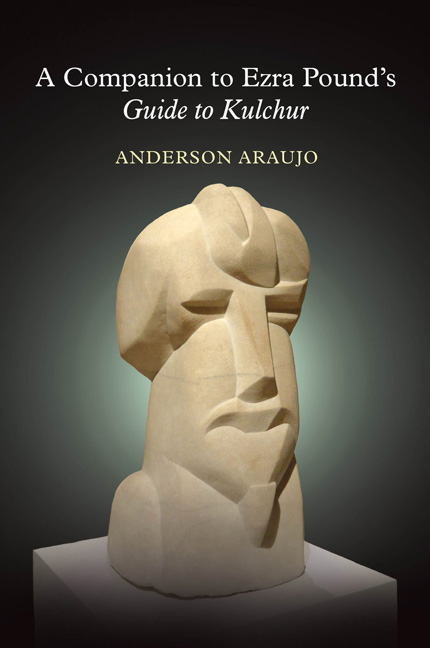Book contents
- Frontmatter
- Contents
- Acknowledgments
- Abbreviations
- Introduction
- Guide to Kulchur
- Part I
- Section I
- Section II
- Part II
- Section III
- Section IV
- Part III
- Section V
- Section VI
- Part IV
- Section VII
- Section VIII
- 29 Guide To Kulchur
- 30 The Proof Of The Pudding
- 31 Canti
- 32 The Novel And So Forth
- 33 Precedents
- 34 On Arriving And Not Arriving
- 35 Praise Song Of The Buck-Hare
- 36 Time-Lag
- 37 The Culture Of An Age
- Section IV
- Part V
- Section X
- Section XI
- Part VI
- Section XII
- Section XIII
- Addenda: 1952
- Notes
- Index
36 - Time-Lag
from Section VIII
- Frontmatter
- Contents
- Acknowledgments
- Abbreviations
- Introduction
- Guide to Kulchur
- Part I
- Section I
- Section II
- Part II
- Section III
- Section IV
- Part III
- Section V
- Section VI
- Part IV
- Section VII
- Section VIII
- 29 Guide To Kulchur
- 30 The Proof Of The Pudding
- 31 Canti
- 32 The Novel And So Forth
- 33 Precedents
- 34 On Arriving And Not Arriving
- 35 Praise Song Of The Buck-Hare
- 36 Time-Lag
- 37 The Culture Of An Age
- Section IV
- Part V
- Section X
- Section XI
- Part VI
- Section XII
- Section XIII
- Addenda: 1952
- Notes
- Index
Summary
Van Buren's autobiography: Cf. note GK 30.
Père Lacharme's latin … Mohl's edition: Cf. note GK 205.
Regio quam alluit … he is beautiful like a gem: Pound quotes the Latin passage from the second Confucian ode in Book IX (Part I) of Lacharme's Chi-King, and translates nearly the entire ode. The 1891 English translation of the Shī-King, which Pound derides “an infamy” here, is probably the metrical translation by William Jennings, who titles the ode “Official Niggards.” Jennings ends the ode with the only line that Pound omits, “Sure, not the Clan-Recorder is with them!” Legge translates the line as, “But, perhaps, he is not what the superintendent of the ruler's relations should be.”
O mus ingens … meum comedere: The first line of Ode 7, Book IX in Lacharme's translation. Pound adds the exclamatory “O” at the beginning of the line, which in Legge's translation reads, “Large rats! Large rats! / Do not eat our millet.”
Dated U. of Penn. 1906 … original research: Pound earned an MA from the University of Pennsylvania in 1906, where he had hoped, as he recalls in Canto 29, to pursue “a career with honor / To step in the tracks of his elders” (29/144). He did obtain a Harrison Fellowship aimed at funding research toward his doctoral dissertation. However, as implied here, Pound's doctoral bid met with fierce opposition from Pennsylvania faculty (cf. note GK 61).
Nulli curae tibi fuerunt res meae: “And you have not been willing to show any regard for us,” from Ode 7, Book IX in Lacharme's translation.
- Type
- Chapter
- Information
- A Companion to Ezra Pound's Guide to KulcherGuide to Kulcher, pp. 242Publisher: Liverpool University PressPrint publication year: 2018



